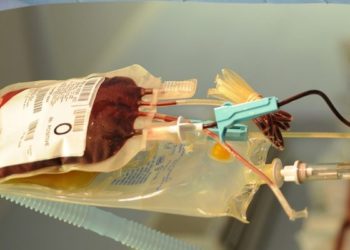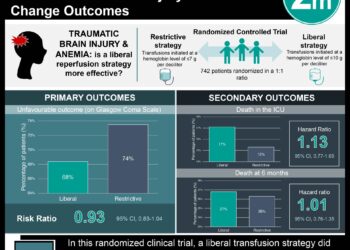Data supports limiting blood transfusions for moderate anemia
1. The authors observed in this retrospective cohort study that transfusion rates decreased among patients from 2010 and 2014.
2. Paralleling decreasing transfusion rates, the authors observed a reduction in 6-month mortality rates among patients with moderate anemia from 2010 and 2014.
Evidence Rating Level: 2 (Good)
Study Rundown: Anemia is a common condition in hospitalized patients and is managed with blood transfusions when patients’ hemoglobin drops below a safe threshold. Randomized controlled trials have supported decreased red blood cell (RBC) transfusions and short-term tolerance of in-hospital anemia. The authors of this study aimed to describe the prevalence of anemia at and after hospital discharge, as well as associated morbidity and mortality events. The purpose was to assess long-term outcomes related to transfusion practice. Overall, the authors concluded that data supports limiting blood transfusions for moderate anemia among patients. Despite reductions in median hemoglobin level at discharge, pre-transfusion hemoglobin levels, and total blood transfusions, there were reductions in 6-month rehospitalization and mortality rates in patients with anemia. The main limitation of this study was that there were possible unmeasured confounding factors that the authors could not control for in the analysis. Further, the patients included represented patients from northern California and may not be representative of all the United States.
Click to read the study, published today in Annals of Internal Medicine
Click to read an accompanying editorial in Annals of Internal Medicine
Relevant Reading: Anemia and its clinical consequences on patients with chronic diseases
In-Depth [retrospective cohort]: In this retrospective cohort study, the authors assessed a total of 445,371 surviving adults between January 2010 and December 2014, who had a total of 801 261 hospitalizations collectively. The main measurements were hemoglobin levels, RBC transfusions, re-hospitalizations and mortality events within 6 months of discharge from the hospital. It was found that there was an increase from 20-25% between 2010 and 2014 of moderate anemia at hospital discharge (defined as hemoglobin levels between 7 and 10 g/dL) (P < 0.001). The rates of RBC transfusions declined by 28% (39.8 to 28.5 RBC units per 1000 patients, P < 0.001). The 6-month adjusted mortality rate decreased from 16.1% to 15.6% (P = 0.004) during the study period.
Image: PD
©2018 2 Minute Medicine, Inc. All rights reserved. No works may be reproduced without expressed written consent from 2 Minute Medicine, Inc. Inquire about licensing here. No article should be construed as medical advice and is not intended as such by the authors or by 2 Minute Medicine, Inc.






